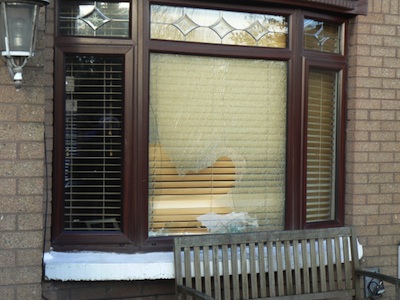
A sudden attack on the small nationalist enclave of the Short Strand tonight saw the homes of elderly residents set ablaze and a group of adults with special needs come under petrol bomb attack.
For once, there was no attempt to disguise the openly sectarian nature of the attack. Just after 8pm, a masked loyalist mob gathered under the cover of darkness to hurl petrol bombs at the homes of nationalists, setting some of them briefly ablaze.
St Matthew’s church and Parochial Hall had to be evacuated. Residents said the adults with Special Needs had experienced ‘grave distress’ as petrol bombs exploded while they were engaged in group activities.
Sinn Fein councillor Niall O’Donnghaile described the attack as “blatant, well planned and organised”.
“This evening homes on Strand Walk came under petrol bomb attack from a unionist crowd on the Newtownards Road,” he said.
“This was a blatant, well planned and organised sectarian attack on this community from those gathered on the Newtownards Road. A special needs group were forced to flee from St Matthews Parochial Hall.
“It has nothing at all to do with flags or identity. It is an attempt by unionists to intimidate a small Catholic community.”
Unionist community worker Jim Wilson admitted loyalist youths started the trouble, but blamed ‘outside elements’.
UNDER SIEGE
Many of the homes targeted house pensioners who have been struck repeatedly by loyalist paramilitaries over the years. Some were again forced to evacuate tonight.
The violence has its roots in an escalating campaign against Belfast City Council’s decision to reduce the number of days the British flag flies over the building, a totemic symbol for unionists.
The paramilitary UVF have helped to orchestrated a widespread campaign of street disturbances and road blockings for over a month. But the past two weeks has seen their campaign become increasingly violent and militant.
Separated from the main nationalist community by the River Lagan, the isolated Catholic community of the Short Strand has come under siege on countless occasions over the past 50 years. In 1969, attacks on St Matthew’s church arguably marked the outbreak of the current conflict.
PSNI APOLOGY
Last Saturday afternoon, in broad daylight, a loyalist mob marched into the combustible interface and began hurling bricks into the doors and windows of nationalists living near the Albert Bridge. That was followed by large-scale hand-to-hand clashes and hours of chaotic rioting.
The trouble followed a highly controversial decision by the PSNI to seal off a more northerly route from loyalists returning from a city centre protest, who then theatrically declared their intention to take their march ‘down the Markets’ [southeast Belfast].
The PSNI today sought to explain its apparent role in the decision to divert an illegal loyalist parade towards a site of certain conflict.
Police chief Matt Baggott claimed his force ‘could not have foreseen’ the outcome, and apologised to the residents of the Short Strand. He said a ‘breakaway’ mob of loyalist protesters had marched into the Short Strand. “Residents should not have been put through that. I’m sorry they were put through that trauma,” he said.
Visiting the Short Strand on Sunday, Sinn Fein’s Gerry Adams warned of the potential for the loss of life in the violence, and accused the PSNI of “facilitating” illegal loyalist protests.
“The people of the Short Strand were let down by the PSNI and let’s be very clear about this, the people in the Short Strand would not have an awful lot of confidence in the PSNI to start with,” he said.
“But what they do have is a certain faith that things will get better and that we can have decent and proper civic policing.
“The PSNI have to police in a fair way right across this community, and it isn’t just republicans and nationalists are concerned that there appears to be a facilitation of illegality so that has to stop.”
BATTLEGROUND
East Belfast has become the main battleground for the current cycle of violence, with almost nightly riots over the past ten days.
Last month, unionist protestors targeted the offices of the moderate unionist Alliance Party. Local MP infuriated the more hardline DUP at the last election by taking a Westminster seat from the party leader, Peter Robinson. Short Strand nationalists were accused by the DUP of supporting Long’s election, possibly fuelling the recent attacks.
Paramilitary bosses are also said to be angered and threatened by continuing prosecutions arising from so-called ‘supergrass’ Mark Haddock, who could testify against the UVF organisation’s leadership. Senior UVF members are believed by some to be manipulating the violence as a form of coercion against the British authorities.
Sinn Fein Deputy First Minister McGuinness warned the UVF were challenging the political institutions.
“I think there needs to be resolute action not just from the police but political leaders,” he said.
He warned about the impact on community relations and the ability to attract foreign direct investment into the Six Counties.
“This has travelled all around the world for a terrible news story. It is so depressing and it needs to be brought to an end.”
![[Irish Republican News]](https://republican-news.org/graphics/title_gifs/rn.gif)
![[Irish Republican News]](https://republican-news.org/graphics/title_gifs/harp.gif)

